In this article
You’ll need a valid NH fishing license if you’re 16 or older to fish in New Hampshire waters. Licenses come in several types, including resident ($45) and non-resident ($63) options, with special rates for seniors and veterans. You can purchase your license online through NH Fish and Game, in person at authorized locations, or through licensed agents. You’ll need proof of residency and age verification, plus a valid photo ID during fishing. Both freshwater and saltwater licenses are available, and NH saltwater permits are valid in Maine and Massachusetts waters. Comprehending the complete licensing requirements will guarantee you’re fully prepared for your fishing adventure.
Summary
- NH fishing licenses are mandatory for anyone 16 and older, with residents paying $45 and non-residents paying $63 for annual permits.
- Licenses can be purchased online, in person, or through authorized agents, requiring proof of residency and valid photo identification.
- Separate licenses are needed for freshwater and saltwater fishing, with combination options available for both types.
- NH saltwater fishing licenses are valid in Maine and Massachusetts waters through reciprocal agreements.
- Special rates apply for youth (16-18), disabled veterans, and seniors over 68, with free fishing permitted for children under 16.
Mastering the Fishing NH License: A Comprehensive Guide
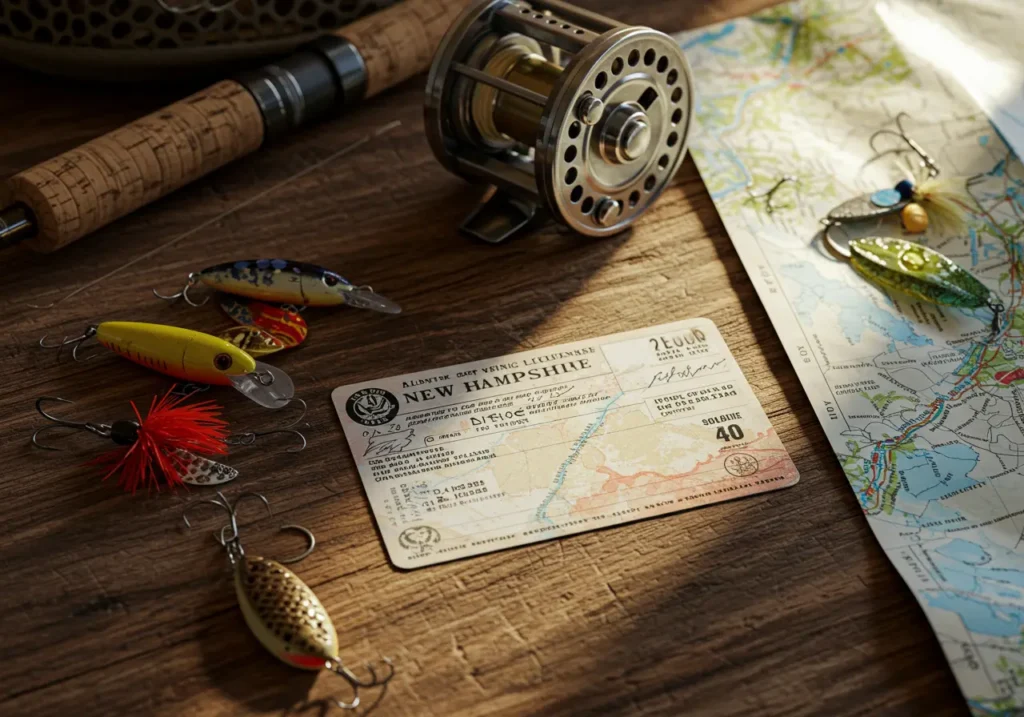
With over 12,000 miles of rivers and streams and nearly 1,000 pristine lakes and ponds, New Hampshire’s waters beckon anglers from across the country.
Before you cast your line, though, you’ll need to navigate the state’s fishing license requirements, which protect these significant resources for future generations.
If you’re 16 or older, you must obtain a fishing NH license before attempting to fish in any state waters. The process is straightforward through wildlife.nh.gov, where you’ll find options for both resident and non-resident fishing licenses.
For residents, the freshwater fishing license provides year-round access to the state’s inland waters, while non-resident anglers can choose from flexible options including 1-day, 3-day, or annual permits.
The NH fishing license cost varies based on your residency status and the duration you choose. All license fees directly support conservation efforts and habitat maintenance.
When you purchase your license, you’ll need to provide proof of residency and age verification.
Keep in mind that license regulations may differ for specific waters or species, so always check local requirements before fishing.
Who Needs a Fishing NH License?

You’ll need an NH fishing license if you’re 16 or older, whether you’re a resident or visitor planning to fish in the state’s waters.
As children under 16 can fish freely without a license, adults must choose between freshwater and saltwater licenses based on where they plan to cast their lines.
Your residency status will determine your license fees and options, with special rates available for qualifying individuals like disabled veterans and resident seniors over 68.
Age and Residency Requirements
Securing a New Hampshire fishing license is mandatory for anyone 16 and older who wants to fish in the state’s waters. If you’re under 16, you won’t need a regular fishing license, though you might need special permits for specific activities like tournament fishing.
Your residency status plays an essential part in establishing your license costs and requirements. To qualify as an NH resident, you’ll need either a valid New Hampshire driver’s license or a non-driver photo ID from the NH Department of Safety. This distinction matters since resident licenses are more affordable – for example, resident freshwater fishing licenses cost $45, whereas nonresident freshwater fishing licenses run $63.
If you’re between 16 and 18, your license status depends on your parent or legal guardian’s residency. When your parent or guardian is a New Hampshire resident, you’re eligible for resident license rates, even should you not have your own NH identification.
Keep in mind that regardless of residency, all licenses contribute to significant conservation efforts and fisheries management across the state. These fees help maintain healthy waterways and support wildlife protection programs.
Freshwater vs. Saltwater Licenses
Every angler in New Hampshire must understand the essential distinction between freshwater and saltwater licenses before casting their first line.
You’ll need separate licenses for each type of water, and there’s no way around this requirement if you plan to fish in both environments.
When you’re freshwater fishing in New Hampshire’s 975 lakes and 12,000 miles of rivers and streams, you’ll need a freshwater license. This permit covers all species except Atlantic salmon brood stock.
For saltwater fishing, you’ll need a specific license to fish in coastal waters and estuarine areas, which include any water affected by tides or below dams and fishways.
Here’s a significant point for New Hampshire residents: Although your saltwater license is valid in Maine and Massachusetts waters, you can’t use their licenses to fish in New Hampshire’s coastal waters.
For example, if you’re fishing the Lamprey River, you’ll need a saltwater license below the dam in Newmarket but a freshwater license above it.
Keep in mind, that both resident freshwater fishing and nonresident freshwater fishing licenses are available, with different fee structures for each category.
Types of Fishing NH Licenses Available
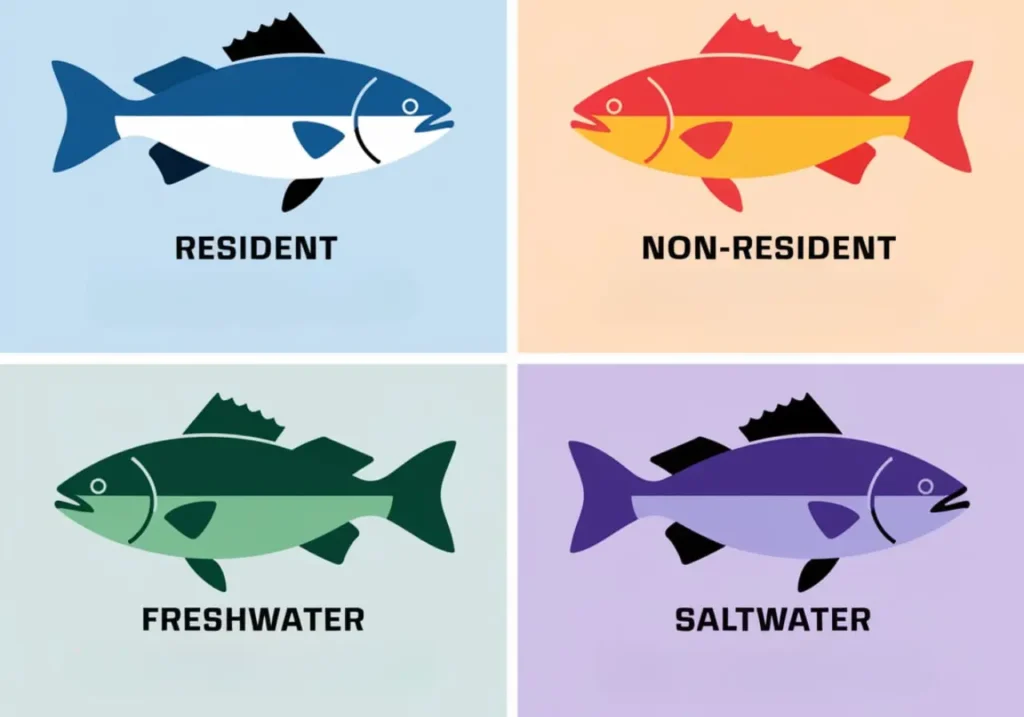
You’ll find a range of fishing license options in New Hampshire to match your specific needs.
When choosing between freshwater licenses, you can select from annual resident and non-resident permits, along with convenient short-term options like 1-day, 3-day, and 7-day passes.
You can likewise opt for combination licenses that cover both fresh and saltwater fishing, making it easier to enjoy every one of New Hampshire’s diverse fishing opportunities.
Freshwater License Options
The diverse range of freshwater fishing licenses in New Hampshire accommodates both residents and non-residents with varying needs. If you’re a resident, you can choose between an annual freshwater fishing license at $45, which includes the Fisheries Habitat Fee, or opt for a 1-day license for shorter trips.
Non-residents have flexible options with 1-day, 3-day, and 7-day freshwater fishing licenses, allowing you to match your license duration to your visit.
Senior residents get special consideration in New Hampshire’s licensing system. If you were born in 1948 or later and are at least 68 years old, you’ll qualify for a discounted annual senior freshwater fishing license at just $7.00, plus applicable fees.
Even better, if you’re a resident born in or before 1947, you’re eligible for a free permanent Milestone license, though you’ll need to obtain it in person or by mail from official Fish and Game locations.
These temporary licenses are valid for consecutive days from their start date, ensuring continuous coverage throughout your fishing endeavors.
Saltwater and Combination Licenses
Beyond freshwater fishing options, New Hampshire’s licensing system includes distinct categories for saltwater and combination activities.
You’ll need a saltwater fishing license if you’re 16 or older and plan to fish in coastal or estuarine waters. The annual license costs $11 for everyone, and in contrast to freshwater licenses, there aren’t any short-term options available.
If you enjoy both hunting and fishing, you can opt for combination hunting and fishing licenses, which cover both activities in freshwater.
Nevertheless, you’ll still need a separate saltwater license for ocean fishing. Senior residents born in 1948 or later can get a senior combination license for $7 when they turn 68, whereas those born before 1948 receive a free permanent license.
For new parents, there’s a Newborn Lifetime Combination License available as a gift certificate. At $304.50, it provides lifetime fishing privileges and hunting rights (after completing hunter education) once the child turns 16.
New Hampshire residents additionally have access to specific clam and oyster licenses, with permanent licenses available free of charge to residents 68 and older.
How to Get Your Fishing NH License
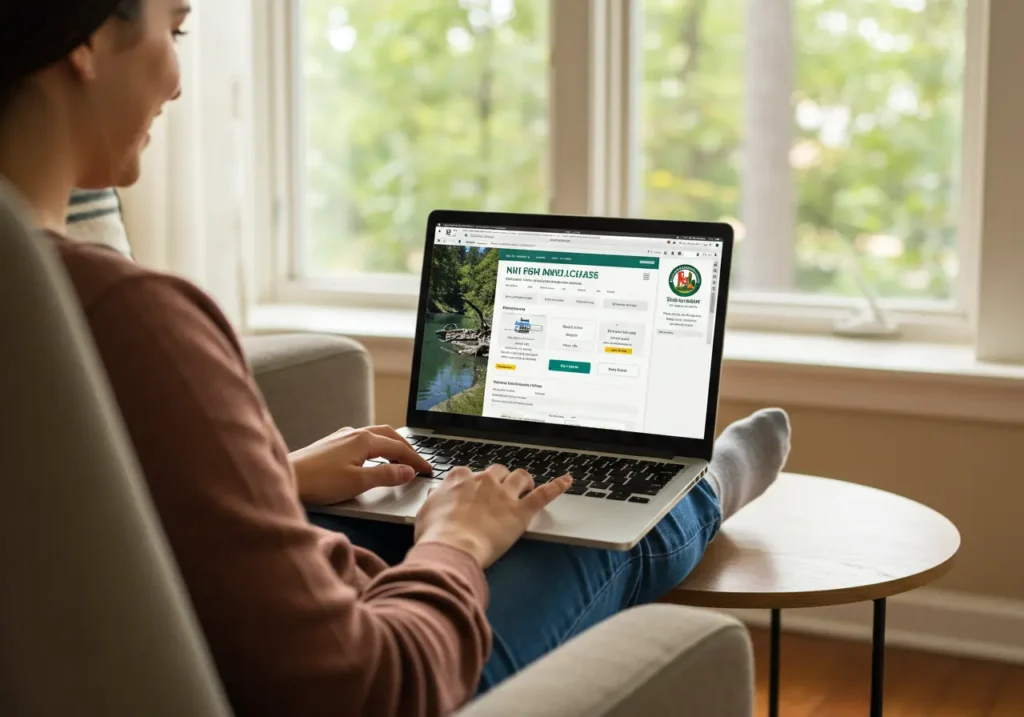
Online Purchase
Purchasing a New Hampshire fishing license online offers the most convenient way to get your credentials through the official NH Fish and Game Department website (wildlife.nh.gov).
To start your online purchase, you’ll need specific identification information. Use your legal name exactly as it appears on your driver’s license, and have one of these ready: your N.H. Hunt/Fish License number, driver’s license number, or Hunter Education Certificate number from 2000 or later.
Once you’ve completed your purchase, print your valid license immediately. During fishing, you can display either a printed copy or a fixed PDF image on your smartphone, but you must carry a photo ID. If you’ve previously purchased a hunting license online, you can obtain your fishing license at Wal-Mart. Recall, license agents can assist if you encounter any issues during the online process.
In-Person and Mail Options
Even though online purchasing offers convenience, New Hampshire provides two additional ways to obtain your fishing license: in-person and by mail.
You’ll find 185 license agents throughout the state, including sporting goods stores and town clerks, ready to process your request. The New Hampshire Fish and Game offices in Concord, Keene, Lancaster, and New Hampton likewise provide in-person service.
When visiting a location to purchase your license, keep in mind these crucial requirements:
- Valid identification, such as a driver’s license
- Payment for the license plus a $2.00 transaction fee
- Proof of education course (for hunting license only)
- Previous license (if applicable)
If you prefer mail transactions, send your application and check to the Fish and Game headquarters in Concord. Include a self-addressed, stamped envelope to receive your license.
Lost your license? You can get a free reprint from your original local agent or the Concord headquarters. Bear in mind hunting licenses require additional documentation, including proof of completing a hunter education course or showing a previous hunting license.
Key Fishing Regulations and Conservation
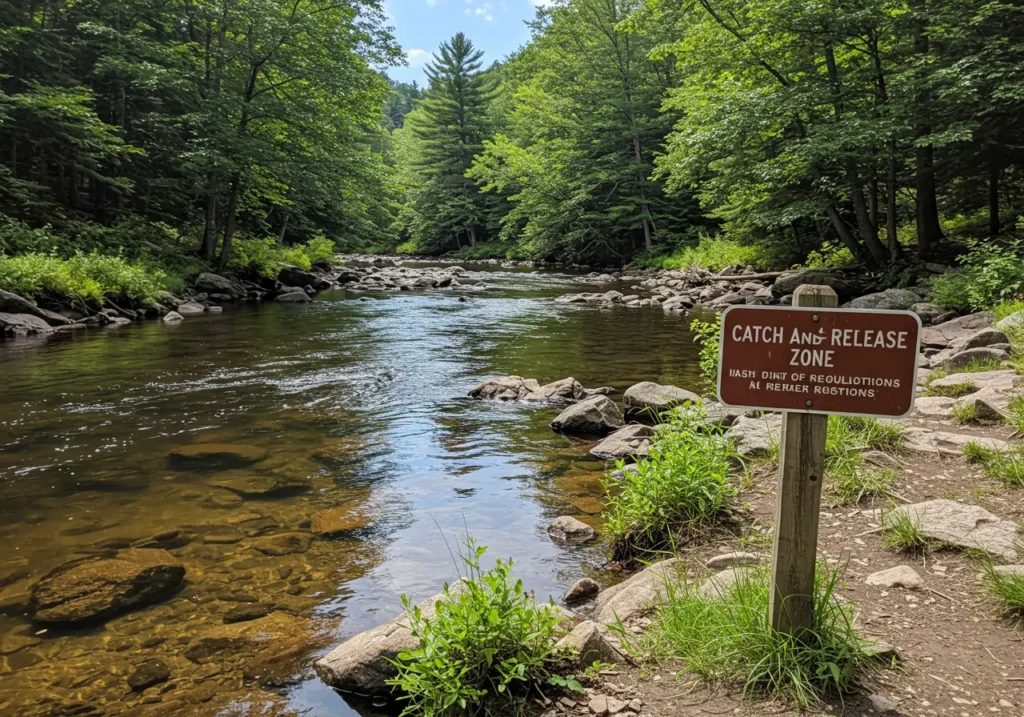
When you’re fishing in New Hampshire, you’ll need to follow specific regulations that safeguard fish populations, including size limits and catch quotas which vary by species and location.
You’re playing an essential role in conservation efforts every time you purchase a license, as these fees directly support habitat preservation and fishery management programs.
Your compliance with local fishing laws isn’t just about following rules—it’s about ensuring future generations can enjoy New Hampshire’s rich aquatic resources through sustainable fishing practices.
Understanding Specific Regulations
Fishing regulations in New Hampshire fall into three main categories: general rules, special provisions, and conservation requirements.
You’ll need to understand these specific rules before heading out to any water body, as regulations can vary significantly between locations. The NH Fishing Digest is your vital guide for staying compliant with all current requirements.
Key regulations you must follow include:
- Checking specific classifications for each water body, as rules differ for Lake Trout, Salmon Lakes, and Wild Trout Ponds
- Following catch-and-release guidelines and size limits to protect fish populations
- Observing seasonal restrictions, especially for salmon fishing (April 1 to September 30)
- Avoiding snagging or foul-hooking fish, which requires immediate release
Your fishing license fees directly support conservation efforts and habitat development throughout New Hampshire’s fisheries.
When you purchase a license, you’re contributing to significant programs that maintain healthy fish populations and improve fishing habitats.
Keep in mind to always carry your license during fishing and stay updated on regulation changes through the NH Fish and Game Department’s official resources.
Supporting Conservation Efforts
The purchase of your NH fishing license sets in motion a potent chain of conservation efforts across the state. When you buy a license, you’re directly supporting the New Hampshire Fish and Game’s crucial conservation programs, including habitat restoration and fish population management. Your contribution includes a $1 fisheries habitat fee that goes straight to maintaining healthy aquatic environments.
You’ll further support sustainability by following fishing regulations and practicing responsible catch-and-release techniques. When releasing fish, use barbless hooks and minimize handling time. The Fisheries Habitat Fund relies on your compliance with size and bag limits to maintain healthy fish populations. Keep in mind to practice responsible disposal of fishing lines and other materials to protect wildlife. You can additionally make extra donations to endangered species programs through the New Hampshire Fish and Game Department. Additionally, these efforts align with ethical angling standards that promote responsible fishing practices.
Reciprocal Agreements and Interstate Fishing
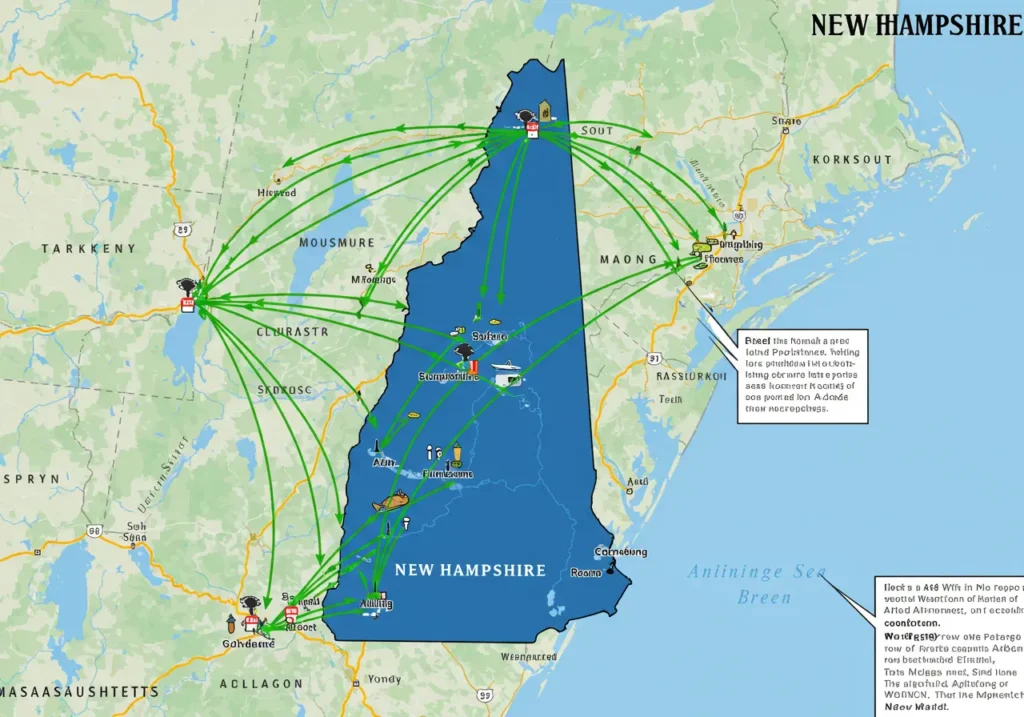
When you’re planning to fish in waters that border New Hampshire and its neighboring states, you’ll need to understand the reciprocal agreements that allow you to use your home state’s license.
You can fish in certain shared waters with your valid NH license or a license from a neighboring state that has these agreements.
These agreements extend to specific border lakes and rivers, but you’ll still need to follow each water body’s individual regulations for catch limits and seasonal restrictions.
Fishing in Border Waters
Comprehending border water regulations is crucial for anglers who fish near state boundaries. New Hampshire’s reciprocal agreements with neighboring states make it easier for you to fish across state lines, but you’ll need to understand specific rules for different water bodies.
Here’s what you need to know about border water fishing:
- Your NH saltwater fishing license is valid in Maine and Massachusetts coastal waters.
- For freshwater fishing between Maine and NH, you can use a license from either state on shared water bodies.
- Interstate waters like Balch Pond, Great East Lake, and the Salmon Falls River accept licenses from both Maine and NH.
- The Connecticut River has specific regulations that vary by section.
When fishing these border waters, you’ll need to follow both general fishing laws and location-specific rules. These include seasonal restrictions, equipment requirements, and bait limitations.
For example, if you’re fishing in Maine-New Hampshire interstate waters, you must comply with specific baitfish regulations.
Keep in mind that as reciprocal agreements exist, you’ll still need a valid New Hampshire license to fish in NH-only waters.
Saltwater Fishing Across States
Saltwater anglers benefit from New Hampshire’s reciprocal agreements with Maine and Massachusetts, which allow you to fish in these states’ coastal waters using your NH license. This arrangement simplifies fishing along the northeastern coast, albeit you’ll need to follow each state’s specific regulations regarding catch limits and gear restrictions.
If you’re a New Hampshire resident, keep in mind that you must have a New Hampshire fishing license to fish in your home state’s waters, even if you hold a Massachusetts license. Although Massachusetts licenses are valid in several northeastern states’ coastal waters, they don’t override the resident license requirement in New Hampshire.
When fishing across state lines, you’ll need to stay informed about local regulations. Each state maintains different rules for bag limits, size restrictions, and permitted fishing gear.
If you’re planning to venture into federal waters beyond three nautical miles offshore, your Massachusetts recreational saltwater permit will suffice. Nonetheless, for highly migratory species like tuna or sharks, you’ll need an additional NOAA Fisheries permit regardless of where you’re fishing.
Final Thoughts
Getting out on the water in New Hampshire requires proper preparation and licensing knowledge. Whether you’re interested in resident freshwater fishing or nonresident freshwater fishing, comprehending license forms and regulations is vital for a successful angling experience.
You’ll find these license prices vary based on duration and residency status, with options available through license online portals or authorized dealers.
Before heading out, keep in mind these key points:
- Verify your boat registration if you’re planning to fish from a vessel
- Review current freshwater fishing regulations for your intended fishing location
- Check senior freshwater fishing privileges if you qualify for age-related discounts
- Confirm you have the correct license type for your planned activities
- Remember that a valid fishing license is essential for compliance with state regulations and supports conservation efforts.
As you prepare for your NH fish adventures, keep your license documentation readily accessible during your time on the water.
Recall that purchasing fishing licenses supports conservation efforts and maintains healthy fish populations for future generations.
If you’re unsure about specific requirements, don’t hesitate to contact the New Hampshire Fish and Game Department for clarification on regulations or licensing questions.
Popular Questions
Can You Fish in NH Without a License?
Can You Have Your Fishing License on Your Phone in NH?
How Long Is a NH Fishing License Good For?
Do You Take a Test for Fishing License?
We are a participant in the Amazon Services LLC Associates Program, an affiliate advertising program designed to provide a means for sites to earn advertising fees by advertising and linking to Amazon.com. As an Amazon Associate I earn from qualifying purchases. We also participate in other affiliate programs. The information provided on this website is provided for entertainment purposes only. We make no representations or warranties of any kind, expressed or implied, about the completeness, accuracy, adequacy, legality, usefulness, reliability, suitability, or availability of the information, or about anything else. Any reliance you place on the information is therefore strictly at your own risk. Additional terms are found in the terms of service.


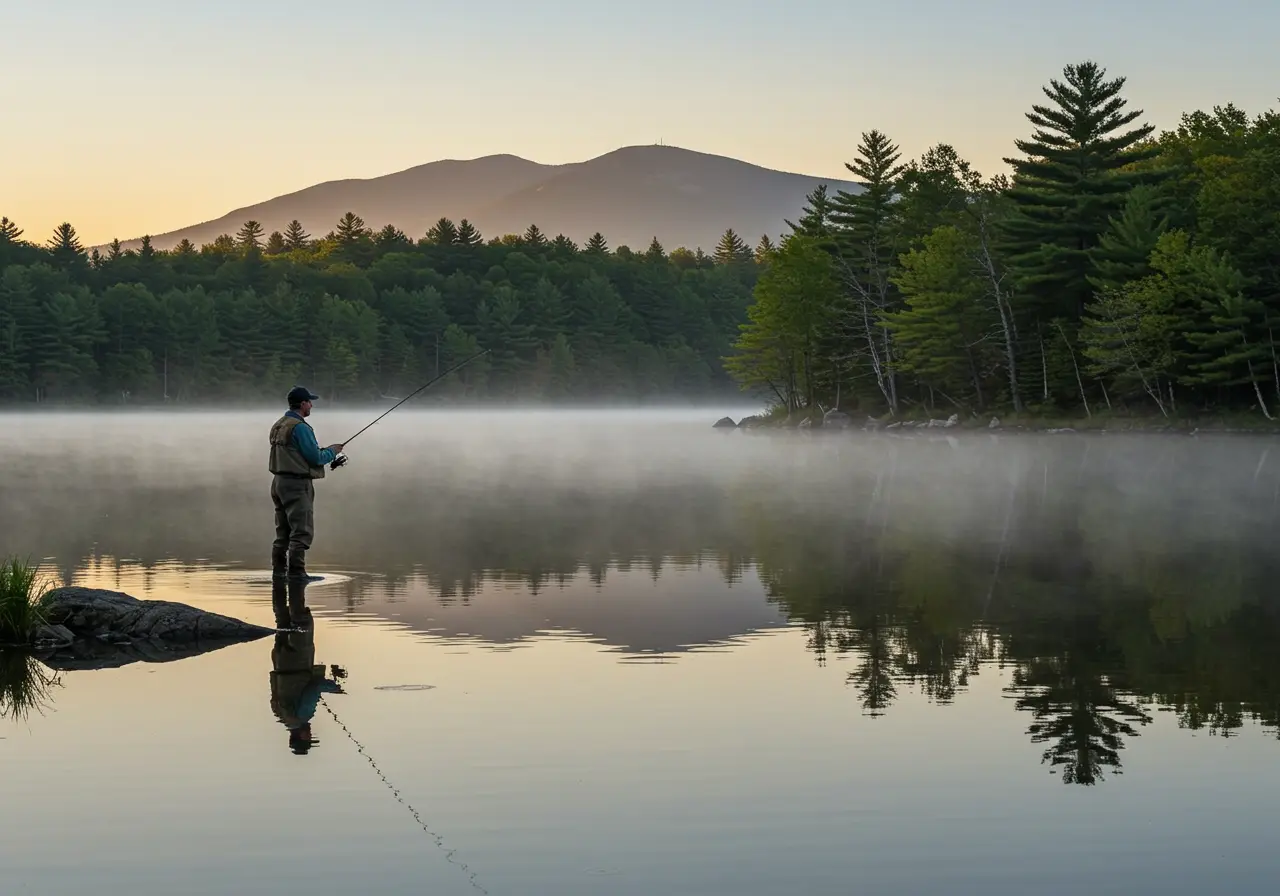

![Ultimate Cabo Fishing Guide: Charters & Tips [2025] Iconic Cabo San Lucas arch at sunrise with a sportfishing boat nearby, representing the ultimate fishing guide destination.](https://masterfishingmag.com/wp-content/uploads/2025/05/01-ultimate-cabo-fishing-guide-2025-238x178.webp)




